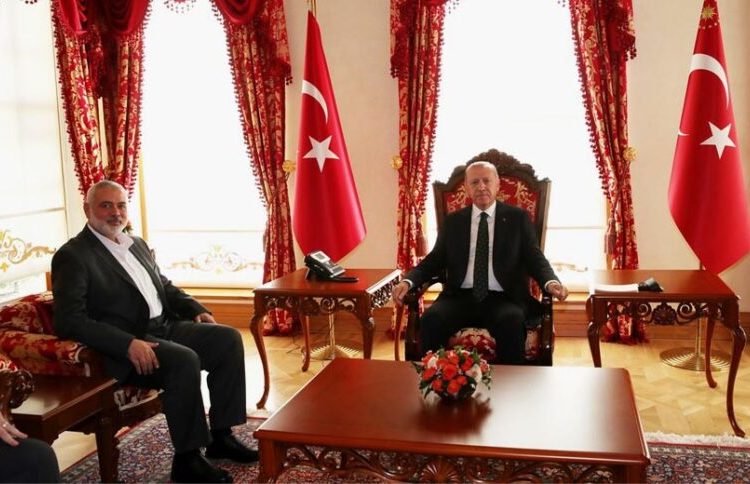Nordic Monitor
The office of the Turkish vice president declined to respond to a parliamentary question on whether the government had granted citizenship to senior operatives of Hamas, which is designated as a terrorist organization by the US, the EU and Israel.
In August Ünal Çeviköz, deputy chairperson of Turkey’s main opposition Republican People’s Party (CHP), submitted a parliamentary question asking Vice President Fuat Oktay how many members of Hamas have been given Turkish citizenship following following reports by international media. In his written response, Oktay declined to answer the question and told Çeviköz to forward his question to the foreign affairs and interior ministers.
Former Ambassador Çeviköz reiterated his request and presented separate written questions to Foreign Minister Mevlüt Çavuşoğlu and Interior Minister Süleyman Soylu on December 4. Çeviköz also asked how many Hamas members have been granted Turkish citizenship since 2002, during the rule of the Justice and Development Party, and whether Hamas members were issued Turkish passports. The ministers declined to respond to the questions, although they were obliged to provide an answer in accordance with Article 98 of the Turkish Constitution.
Parliamentary question submitted by MP Ünal Çeviköz to Foreign Minister Mevlüt Çavuşoğlu:
The Telegraph reported in August that seven of members of Hamas had acquired Turkish citizenship, as well as passports, while five others are in the process of receiving Turkish passports. The Telegraph claimed some Hamas members are living under Turkish aliases.
According to the Telegraph Zacharia Najib, a senior Hamas operative who oversaw a plot to assassinate the mayor of Jerusalem as well as other Israeli public figures, has apparently been granted citizenship.
Speaking to Reuters after the visit of Hamas leaders to Turkey, Roey Gilad, chargé d’affaires at Israel’s embassy in Turkey, said Israel had proof that Turkey was providing passports and identity cards to members of Hamas. “Some are in the process, some already got [the documents], but we are talking about around a dozen,” Gilad stated, adding that Hamas members who received Turkish documents were financing and organizing terrorism from Istanbul, which Turkey denies.
President Recep Tayyip Erdoğan hosted Hamas chief Ismail Haniyeh and other officials on August 22 in Istanbul for the second time this year. Hakan Fidan, the head of Turkey’s National Intelligence Organization (MİT), was also present at the meeting between Erdoğan and Haniye.
Written response by Vice President Fuat Oktay to the parliamentary question:
As the Turkish government continues supporting Hamas and not rejecting claims of Turkish citizenship given to its senior operatives, President Erdoğan is giving mixed signals on improving relations between Turkey and Israel.
Speaking to reporters after Friday prayers in Istanbul on December 25, Erdoğan said Turkey would like to have better ties with Israel but criticized Israeli policy toward the Palestinians as “unacceptable” and a “red line” for Ankara, adding that talks had resumed between the intelligence agencies of both sides.
“The main problem right now is about individuals at the top,” Erdoğan told reporters last week. “The Palestine policy is our red line. It is impossible for us to accept Israel’s Palestine policy. Their merciless acts there are unacceptable. … If there were no issues at the top level, our ties could have been very different,” he said.
Turkey says Hamas is a legitimate political movement that won power through democratic elections. Hamas seized Gaza from forces loyal to Palestinian President Mahmoud Abbas in 2007, and the group has fought three wars with Israel since then.
According to recent reports Azerbaijani President Ilham Aliyev has been trying to mend relations between the two countries, and Azerbaijani Foreign Minister Jeyhun Bayramov called his Israeli counterpart Gabi Ashkenazi to bring up the same issue.
As a sign of its move to normalize relations with Israel, Turkey has decided to appoint a new ambassador to Israel after a two-year absence, Al-Monitor previously reported. In May 2018 Ankara withdrew its envoy over deadly attacks against Palestinians in the Gaza Strip.
Turkey’s spy chief, Fidan, has also been holding secret talks with Israeli officials as part of an effort launched by Ankara, Al-Monitor claimed.
However, the Israeli government has not responded positively to Erdoğan’s initiative, and the presence of Hamas members in Turkey poses an important obstacle to improving political relations between the countries.
Speaking to Asharq Al-Awsat, a high-ranking Israeli minister stressed that bilateral relations will not improve as long as Turkey’s approach to Hamas doesn’t change. “The fact that Hamas’ headquarters is located in Turkey is very problematic. It severely impedes everything,” the minister said.
Relations between Turkey and Israel deteriorated in 2010 following an Israeli naval raid on a Turkish aid ship, the Mavi Marmara, en route to deliver humanitarian aid to the blockaded Gaza Strip. The raid killed 10 activists.
In 2013, with Israeli Prime Minister Benyamin Netanyahu’s apology to Turkey and the payment of $20 million in compensation to the Mavi Marmara victims’ families, Turkish-Israeli relations entered a period of normalization. They restored ties in 2016, but relations soured again in 2018.












